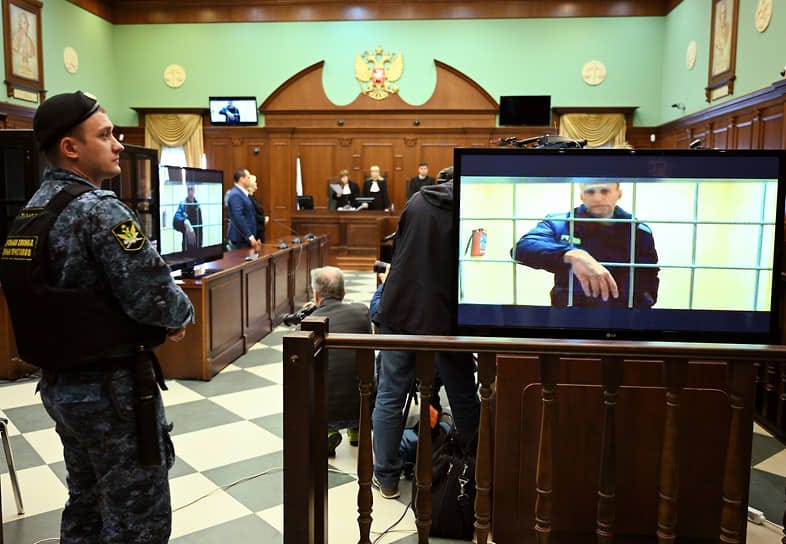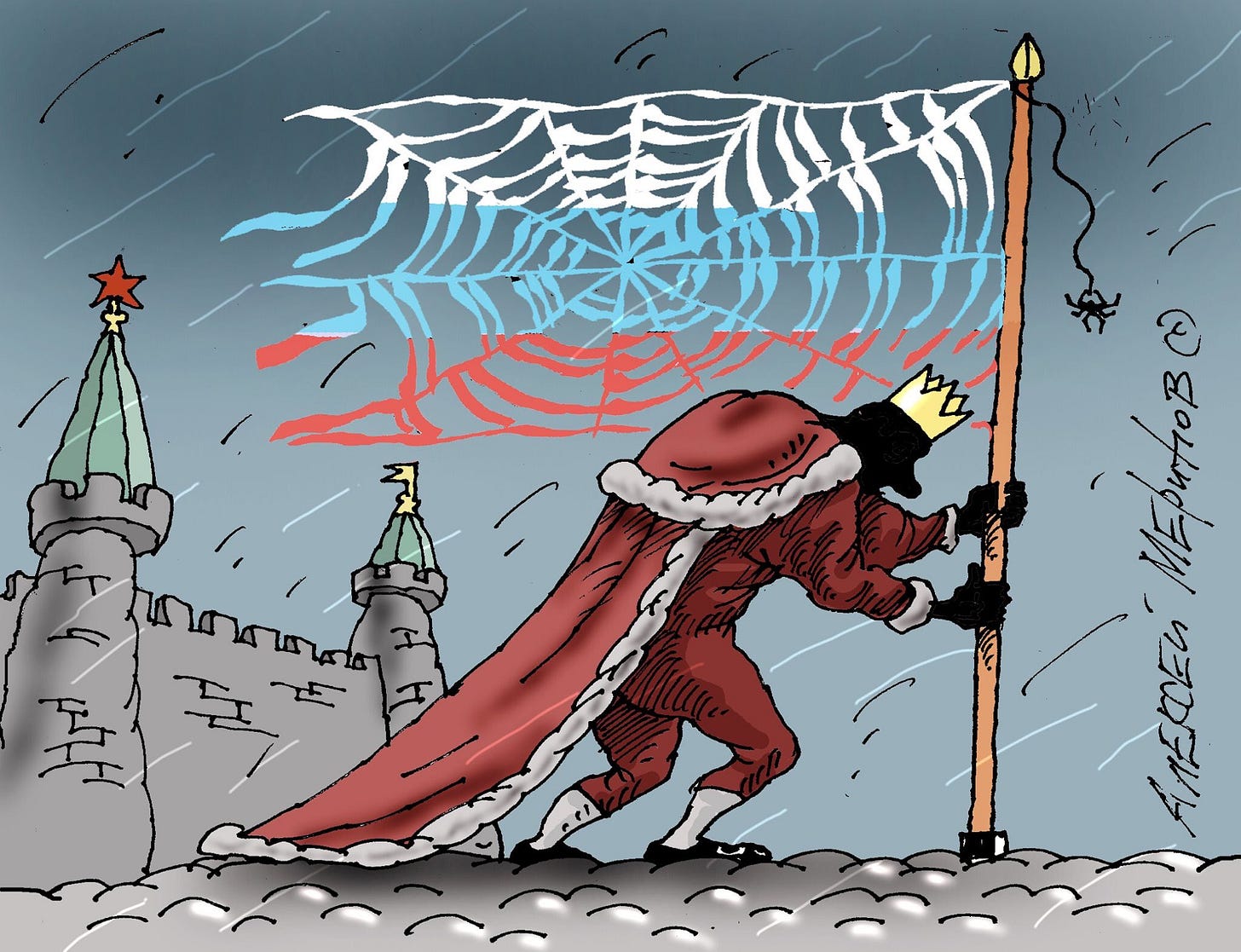May 24, 2022
Jail in jail
Rage of the hawk
TV = truth
No one is against
Jail in jail
The Moscow City Court has rejected the appeal of Alexei Navalny, who was sentenced to nine years. Thus, the sentence entered into legal force, and Navalny soon will be transferred to a high-security penal colony, which has different conditions: Convicts have significant restrictions on the number of visits, parcels, packages, letters, spending money from their account, duration of daily walks in the open air.
Navalny himself participated in the hearing via video link. In his final statement, he spoke little about the substance of the charges against him, focusing on the political situation in Russia and the war in Ukraine.
Your system is based on fear. To be afraid of yourself is a crime against your future and your children. My point is that these processes of yours are meaningless. What do you want to achieve? To gain control? To stop the progress of Russia? What do you want to do? On the whole, [everything] that you are doing makes no sense. You will suffer a historic defeat in this stupid war you have started. It has no purpose and no meaning. What are we fighting a war for? What should they [Ukrainians] do to get behind them?
In addition, he said that Judge Natalia Repnikova, who commuted his suspended sentence to a real one, allegedly conveyed through lawyers that he knew that she regretted her involvement in persecuting the politician and considered him a brave man. Shortly after that, according to Navalny, the judge died suddenly of the coronavirus.
In early May, Navalny said he would be transferred to a maximum-security penal colony in Melekhovo, 150 kilometers east of his current prison in the Vladimir region. Navalny had heard about it from other inmates, who told him that the colony would set up a “prison within a prison” for him.
Rage of the hawk
Security Council Secretary Nikolai Patrushev, the direct political, ideological, and moral antipode of Alexei Navalny, gave an interview. I will focus on two points, one emotional and one substantive.
Question: The U.S. and other Western states openly demonize Russia, turning to direct insults. What does this have to do with?
NP: The Anglo-Saxon style has not changed in centuries. So today, they continue to dictate their terms to the world, rudely flouting the sovereign rights of states. Covering up their actions with words about the struggle for human rights, freedom, and democracy, in fact, they realize the doctrine of the “golden billion,” supposing that a limited number of people can prosper in this world. The destiny of the rest, they believe, is to bend over backward in the name of their goal.
To increase the wealth of a bunch of tycoons in the city of London and Wall Street, the big capital-controlled U.S. and British governments are creating an economic crisis in the world, starving millions of people in Africa, Asia, and Latin America, limiting their access to grain, fertilizer, and energy resources. By their actions, they provoke unemployment and a migration catastrophe in Europe. Uninterested in the prosperity of European states, they do everything to their disappearance from the pedestal of economically developed countries. And for absolute control of the region, they put Europeans on a chair with two legs called NATO and the EU, watching them balancing disdainfully.
I remember well the rhetoric of the leaders of the Soviet Union in the ’70s and ’80s. I have to say that there was never such rage and hatred in their words, such a distorted view of reality in their comments. But I think you could hear all of this in the offices of the KGB, where Patrushev ended up after graduation and where he spent his whole life.
Question: Some of our readers sometimes express concern about, as they write, “the delaying of the special operation in Ukraine.”
NP: We are not chasing deadlines. Nazism must either be eradicated 100%, or it will raise its head in a few years and an even uglier form.
Question: How do you assess the chances of successfully completing the special operation?
NP: All the objectives set by the President of Russia will be met.
Question: What kind of fate awaits Ukraine? Will it survive as a state?
NP: The destiny of Ukraine will be determined by the people living on its territory.
Of course, it will not be Patrushev who decides when and why Russia will stop its aggression against Ukraine. But he is undoubtedly one of the people with whom Putin will discuss this issue. Patrushev is prepared for the fact that the war will be a long one, and he believes that Ukraine has little reason to expect that its sovereignty will be preserved.
TV = truth
A poll by the Levada-Center indicates that television remains the primary source of news for Russians. Although its popularity as the main means of obtaining news is gradually decreasing, this process has slowed down since the beginning of 2021. Somewhat prior, in early 2020, the attention of Russians to social networks and online publications ceased due to aggressive censorship and the shutdown of many media outlets by the decision of the Kremlin.
Perhaps not surprisingly, of all possible sources of information, the vast majority of Russians trust television (52%) the most. Trust in internet publications and social networks is at a much lower level; moreover, it has fallen noticeably since the outbreak of the war in Ukraine. The explanation for this looks pretty prosaic: Most people do not want to associate themselves with aggressors, so the picture offered by television allows them to maintain mental comfort. Moreover, while a Russian viewer sees the same thing on all news channels when he visits the internet, he receives various points of view and doesn’t want to waste time figuring out what is true and false.
No one is against
The Duma passed the first reading of a bill that would allow the Prosecutor General’s Office to revoke a media outlet’s registration and revoke its license for television and radio broadcasting if fakes, including those about the Russian military, are circulated and call for sanctions. In addition, media registration could be revoked for “spreading untrue information under the guise of reliable reports about the use of the Russian armed forces or the work of Russian government agencies abroad.” In all, 361 deputies voted “for,” none voted “against,” and four abstained.
No right to leave the country
Russia’s presidential representative for international cultural cooperation, Mikhail Shvydkoi, said Russian museums would not send works of art to foreign exhibitions, including friendly and neutral countries. It will be possible to return to participation in foreign exhibitions “when the situation is calmer,” he believes.
I think you have to understand that these things must be at home for a while. Perhaps this is most important that today, this is a common position with the Ministry of Culture and the Russian Foreign Ministry: Pieces of art should stay at home until the situation calms down. Because it seems that today it is better to host exhibitions than to send Russian works of art abroad, even, maybe, to friendly and neutral countries.
This decision was taken after, in early April, the Finnish Customs authorities, citing EU sanctions, detained at the border paintings from Russian museums that had participated in exhibitions in Italy. However, four days later, this decision was reversed, and all pictures were returned to Russia. According to Shvydkoi, 95% of the exhibits from Russian museums that were outside Russia at the beginning of the aggression against Ukraine had been returned to their home places.







